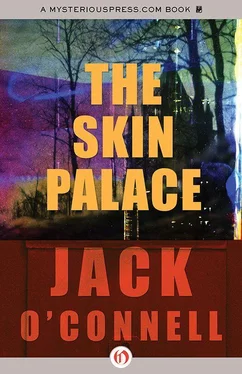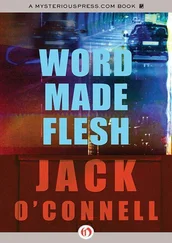She drifted into the movies and took up residence there. She drifted into photography and gave herself away. She drifted into numbness upon the death of her mother and let it take her. She drifted into the banality of the Snapshot Shack and let it cover her. And she drifted into Perry and surrendered without question or thought. Because in each case it was easier than fighting a current. It was easier to ride out forces that she knew would be stronger than her own small desires.
Like now, just like now, like this moment, when it’s so much easier to accept that it’s fated, that she’ll go to Hugo Schick, that she’ll eventually walk all the way to Herzog’s Erotic Palace, to this monument to multiple illusions, this church of light and shadow and manipulation that Hugo has filled with dozens of entwined naked bodies, moaning and writhing for the sake of an imagined masterpiece. She’ll stand in the middle of the pretentious, choreographed orgy, totally distant from even the idea of all the fabricated connections, of the endless daisy chains of coupling taking place on the floor below her feet. She’ll stand alone in the middle of one more crowd, one more gathering of interconnected people, and like a child, like a powerless toddler, without rights or skills, she’ll ask Schick why she’s there. She’ll ask why the events of this week have taken place, what knowledge she’s supposed to gain from all that’s happened.
She’ll go to the Skin Palace, to Hugo Schick, to the filming of Don Juan Triumphant, knowing there will be no real answers. Just another turning of the tide. Because movement feels better than stasis. And because she still doesn’t know what else to do.
Was her mother supposed to impart some kind of wisdom before she passed on? Was there supposed to be some very old ritual whereby on a given night, a specific event determined by a phase of the moon or a vision or a biblical code, Ma was to wake her, to sit her in the kitchen and brew tea, to bring their faces close together, kiss the forehead with a long and warm touch of mother’s lips, bring those lips finally to Sylvia’s ear and whisper words of revelation and epiphany? Did Ma’s ovaries kill her before that clarifying night could take place and she left Sylvia, one of those occasional freaks, one of the uninitiated, the uninformed who stumble around on rainy nights like this one hoping for some substitute disclosure, for some surrogate imparting of wisdom that will heal her, make her like everyone else, trigger these long-hidden and deeply submerged guidance systems that will once and for all put an end to this perpetual drift?
She finds herself on Coburn Street looking in the window of a camera store called Strand’s. She stares down on a blue velvet display of lenses — Hasselblads and Minoltas and Noskowiaks. The lenses are all lined up in perfect rows, black and silver cylinders running from standard, utilitarian pieces to specialty stuff — fish-eyes, ridiculously long telephoto mounts. All this glass bent to alter vision.
A police car pulls past, shines a spotlight on her back. She turns around and waves, imagining what she looks like — hair hanging, sopping, clothes drenched through. The light gets extinguished and the cops move on and Sylvia turns back to the window. She looks beyond the front display to the interior of the shop. It’s lit by a single, dim lamp in the rear and all she can really make out is a glossy sign hanging above the service counter that reads The Electramatic 35: Calibrate the Moments of Your Life.
She walks on, finds an open coffee shop called Café Arco. The night manager is a young Spanish guy who’s totally involved in a worn paperback with a grotesque cover whose title— The Monk —seems oddly familiar. Sylvia orders an espresso, takes a seat and tries not to listen to the argument of a miserable twentysomething couple in an opposite booth. The woman holds her voice at a low mumble, but the man keeps interrupting her monologue, punctuating her long sermon over and over with the same demand— Just tell me why you won’t.
Someone has left an old children’s Highlight’s magazine on the table. Sylvia opens it to the rear and focuses on the hidden picture puzzle until the doomed romance vacates the place. There’s only one other customer, a young man in a dark, rain-rumpled suit, hunched over his coffee at a corner table. He’s got his back to her and Sylvia sits and stares at the rear of his head. Every now and then, the guy lifts a hand from his mug and rubs it over his face, as if he’s having difficulty staying awake. She hears him struggling to breathe as if he’s suffering a terrible chest cold.
Finally, he swallows the last of his coffee, fishes in his jacket pocket, comes out with a handful of change and drops it on the table. Then he pushes his chair back and gets up to leave and their eyes meet.
“It’s you,” Sylvia says, recognizing the huge ears and the bony face, “from Der Garten. The owner’s son.”
The young man rears back as if he’s been accused of something. His eyes squint at her and then recognition plays across his whole face and he says, “The film woman.”
“The film woman,” Sylvia agrees. “I’m sorry but I don’t remember your name.”
“Jakob,” he says with an embarrassed tilt of the head. “Jakob Kay.”
“I’m Sylvia Krafft.”
“Ms. Krafft,” he begins to stammer, “I assure you, I honestly did not mean to—”
She waves away his apology.
“It was my fault,” she says, “I was having a very bad day. I was misinterpreting everything.”
“In any event,” he says, the origin of his accent still unknown, “I am sorry if I bothered you.”
She nods her acceptance and suddenly wants to keep him here a bit longer. She pushes the opposite chair out with her foot and says, “Would you like to join me?”
He stares at her like he doesn’t quite understand, then slowly starts to shake his head no.
“I have some business. There is someone waiting—”
“It’s a raw night,” she says. “And it sounds like you have a pretty awful cold.”
“It’s nothing really,” his eyes moving from Sylvia to the door and then back again.
“I don’t know if you’ve heard,” she says. “But they’re reopening the Ballard Theatre.”
Jakob’s hand goes back over his face, comes down to his neck and tugs at his collar. He nods slowly, then slides into the chair. She lifts her coffee toward him, raises her eyebrows. He declines her offer.
“I know the Ballard,” he says. “I’ve been there. A few years ago. I hadn’t heard this.”
“It’s a rumor. I don’t know how reliable it is.”
“Always the case,” Jakob says, “with rumors.”
There’s an uneasiness they both wish wasn’t there, something more attributable to the night than the chemistry. They stare at each other until the level of discomfort extends across the room to the clerk behind the counter, who calls out to them, “We’ll be closing up soon.”
Jakob tries to clear his throat and manages only a wet-sounding gurgle.
“Well,” he says, “I do have someone I must meet.”
“I suppose,” Sylvia says, “I do too.”
Jakob stands up awkwardly, looks out the door to the street, turns up the collar of his suit jacket.
“I wish,” he says, bowing his head to her, “we had met under different circumstances.”
Sylvia tries for a smile.
“We both like movies,” she says. “Maybe we’ll bump into each other sometime.”
He nods but doesn’t say anything, then walks out of the coffee shop and into the rain.
At twenty to midnight Sylvia leaves a five-dollar bill under her cup and walks back outside. She stays off the main drag and moves over cross streets until she comes to Aragon Ave. She rounds the corner onto Watson at a club called Propa Gramma and moves north toward the Skin Palace.
Читать дальше











